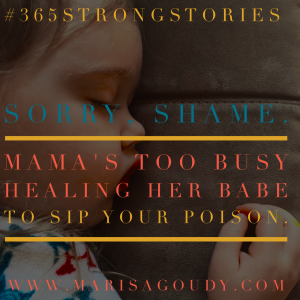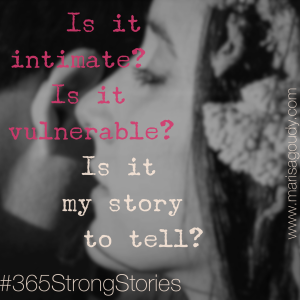
BLOG
The Shame of Shushed Story
“Oh honey, let’s not tell that story.” The words flowed easily from my lips but they were terribly hard to hear, hanging there in the air. I’d delivered them as kindly as I could in the voice of a woman with too many worries and too little sleep. All I wanted was the oasis of a quiet shower and to make it to my first cup of coffee before anyone pulled hair or screeched or required a bandaid.
But I know that silence and distrust and disconnection are born of distracted admonishments. This was a tiny sin that hinted at a deeper darkness.
My six year-old was remembering the beach house that the family rented for several summers. Her memories of eating a dozen clementines gave way to remembering when one older family member had fallen and knocked out a tooth.
I don’t like that memory. It was upsetting and it wasn’t pretty. I felt the pain and the worry of that Cape Cod morning. The guilt that I hadn't been very helpful at the time was (my excuse was morning sickness, but that seems paltry now). None of these thoughts were going to ease me into what was going to be another challenging day, so I shushed her and kept moving.
As I dive deep into what it means to tell stories, I'm learning just as much about how to receive and keep stories. Stories need to be held and reviewed when they bubble up. When they are stifled they become the monsters of shame and doubt and fear.
In trying to protect myself from unresolved hurts, I create new ones for my daughter. In trying to stifle the pure, spontaneous sharing of memories, I am creating new ghosts that are bound to be much more ghoulish the next time they come around.
I am a storyteller. I ask people to walk into the shadows with me so that we can appreciate the light. That means I also need to allow others to tell me their stories - even when I find them unsettling or inconvenient, even when I want to wish the memories away.
Learn how to tell your own stories with greater sensitivity and awareness. Join the free online class, The Story Triangle, on April 5.
Sorry, Shame: This Mama Is Too Busy Healing Her Girl to Sip Your Poison
 We didn’t quite make it a year between visits to the walk-in emergency clinic. There are three things I have learned from the early morning trip to have two-year-old fingers checked out after a door slamming incident:
We didn’t quite make it a year between visits to the walk-in emergency clinic. There are three things I have learned from the early morning trip to have two-year-old fingers checked out after a door slamming incident:
- Telling personal stories on a blog means never having to guess when past major life events occurred. They also lend you strength you may have forgotten you had.
- My little one is accident prone, tough as nails, and sweeter than I thought possible. My big one never means to hurt anyone and her feelings may be more wounded than her sister's digits if we're not careful.
- I’m still woefully and beautifully imperfect. And I am still ok with that. Shame need not apply when I'm busy healing my baby and keeping the big girl from falling into the shame spiral.
Here's an updated 2016 version of that story from last year:
One of my girls had an accident this weekend. Though it was terrifying at the time, it ended up being relatively minor. Now I can claim a parenting merit badge my mom never earned: held my daughter as she got stitched up x-rayed and told she'd merely lose a pinkie nail.
It was an accident, yes, but it could have been prevented. I could have had my hands on the kids instead of sitting an inch beyond an arm’s length away lying in bed three feet away, utterly exhausted by another night of tag teaming sleepless children. I could have said “no, honey a five year old isn’t big enough to carry her one year old sister yet.” screamed "no, you will not slam that door just because your sister is trying to come into the bathroom!"
But I didn’t.
And we ended up at the walk-in med center, covered in blood all swollen up – and sidewalk chalk and dirt from what was supposed to be a typical Saturday spent in a yard just awakening to spring still in pajamas, eyes full of sleep.
We’re so proud of our girl for healing so quickly and handling it all so well. And I’m pleased to report that I’ve emerged from shame’s shadows. Truthfully, the horrible guilt dissipated within twenty-four hours. (Likely that’s because much of the swelling did too).
Truthfully, I skipped shame all together this time because a shamed mama isn't a strong, compassionate, in control of her emotions mama who teaches her girls to be same.
No longer blinded by self-recrimination, I can simply hold my little one tight, overcome with gratitude and rendered speechless by how precious she is to me (and by utter exhaustion).
Yes, gravity won sibling rivalry made us all losers in that split second, but I forgive myself.
I’ve decided that I am mother enough for my daughters – even if I’m woefully and beautifully imperfect.
Is it intimate? Is it vulnerable? Is it my story to tell?
 Writing a story a day is a mad, marvelous mission. Time constraints and the very real limitations on creative energies are valid concerns that might make you quit before you begin.
Another reason to think twice about asking your creative impulses to take the shape of something that can be fully expressed within a twenty-four hour period: the strong stories often want to take a lot longer to be conceived, born, and debuted in this strange, complex world.
Writing a story a day is a mad, marvelous mission. Time constraints and the very real limitations on creative energies are valid concerns that might make you quit before you begin.
Another reason to think twice about asking your creative impulses to take the shape of something that can be fully expressed within a twenty-four hour period: the strong stories often want to take a lot longer to be conceived, born, and debuted in this strange, complex world.
After two months of shaping and sharing these stories, I have finally started to recognize a story that needs to germinate. It would be a disservice to the narrative, the reader, and to me as a writer to force a certain kind of story to sing and perform before it can even cry out its own name.
When you force yourself to work on a deadline, however, it’s nearly impossible to abandon a story that’s three quarters written - especially if it took more than the hour you told it that it deserved.
Today, I wrestled with a story for a couple of hours only recognized that we both needed a rest when it bloomed past the 800 word mark. In a few days, I might be able to tell you if it was a lost cause journal entry with delusions of grandeur or if it’s something real and important that wants to reach beyond the scope of #365StrongStories.
How can you tell if your story needs to be nurtured in secret or if needs to be shoved (lovingly) into the light?
First, follow Brene Brown’s wisdom: is the story intimate or is it vulnerable?
Is the story full of gory details that you don’t want to describe or defend in conversation? That’s too intimate to share.
Or do you feel brave and proud and just the right amount of scared? That’s vulnerability and that’s at the core of every strong story.
And second, ask yourself whether it is your story to tell. If neither intimacy or vulnerability seem relevant to the equation, your story might be asking you to dive deeper or revisit it when you’ve really got something to say.
Sticky subjects that might stink of shame
The story I’m not ready to tell is about parent shaming. I’m very much inspired by Mercedes Samudio’s #EndParentShame work and I was triggered by an exchange I saw in a Facebook group today. It’s such an important topic that we need to start talking about across our communities.
Thing is, I felt nauseated rather than exhilarated as my fingers flew across the keyboard. I think I was more of a voyeur than an ethical memoirist describing her experiences.
All of those are signs that I’m sharing the wrong details about the wrong aspect of a greater truth. You, my story, and my integrity as a storyteller deserve more.
If it’s a strong story, it will wait.
It's my mission to help you discover and tell the strong stories that matter to you, your audience, and your business. Learn more about the You, Your Stories, and Your Audience eCourse.


